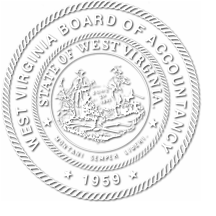The West Virginia Board of Accountancy was created on July 1, 1959 through an Act of the Legislature. As a State agency, the Board consists of six Certified Public Accountants and one public member who represents the public interest. All Board members are appointed by the Governor and confirmed by the Senate. The Board is supported by and operates from the funds received from its licensees, firms and exam applicants. Chapter 30, Article 9 of the West Virginia Code, (the Accountancy Act), establishes the authority for the Board to govern the accountancy profession in West Virginia.
Purpose
The purpose of the West Virginia Board of Accountancy is to protect the public interest in receiving accurate and reliable financial information and assurance through licensure of the Certified Public Accountants (CPAs), Public Accountants (PAs) and accounting firms.
Mission
The Board of Accountancy's mission is to protect the public interest by:
- ensuring that persons issued a certificate as a Certified Public Accountant have met the minimum competency level by setting the education, examination, experience, and continuing professional education requirements necessary to practice public accounting;
- providing resources to the public to verify the licensure and disciplinary status of any licensee; and
- enforcing the Accountancy Law, Board Rules and Rules of Professional Conduct as well as standards governing the practice of accounting.
Rule-Making Authority
The Accountancy Act authorizes the Board to propose rules for legislative approval which include the following:
- The education required of an applicant for the CPA Examination
- The experience required of an applicant for certification/licensure
- The administration of the CPA examination
- The issuance and renewal of certificates, registrations, permits, and authorizations
- The denial, suspension, revocation, and reinstatement of a certificate, registration, permit, or authorization
- The conduct of investigations
- Firm ownership requirements
- Accounting corporations
- Substantial equivalency certificate requirements
- Continuing professional education requirements for licensees, including exemptions
- Peer review requirements
- Standards of professional conduct
- Identifying professional services required to be performed in accordance with the applicable statements on standards
- Use of the titles "certified public accountant", "CPA", "public accountant", and "PA"
- Use of commissions, referral fees and contingent fees
- Fees for the issuance and renewal of a certificate, registration, permit or authorization and other fees authorized by this article
- Other rules the board considers necessary and proper for implementing the provisions of W.Va. Code 30-9-1 et seq.

